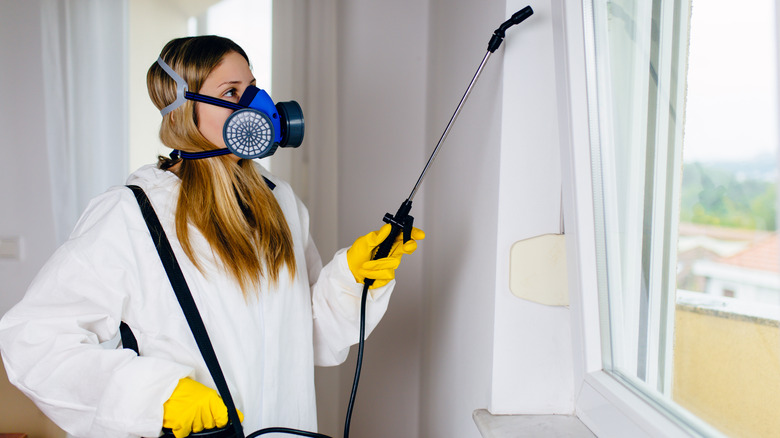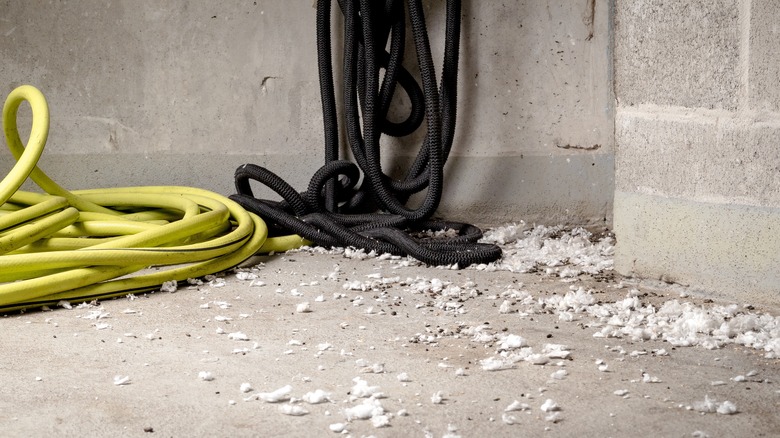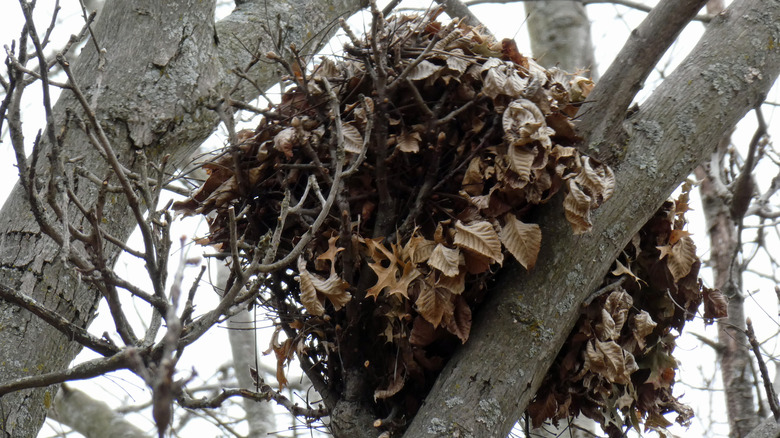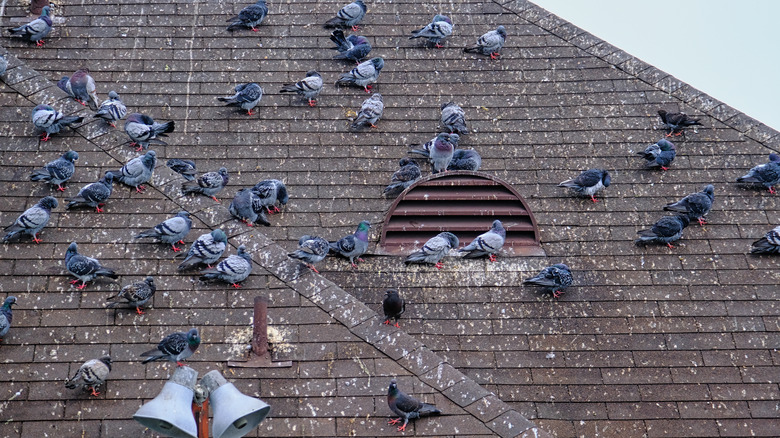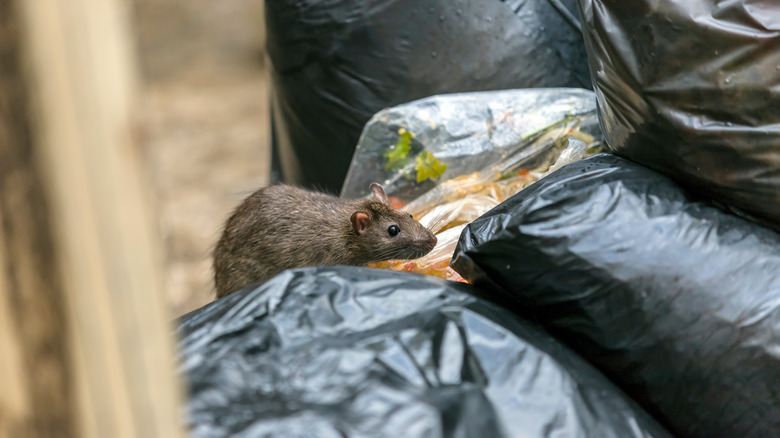This Is When An Expert Says You Need To Call An Exterminator
Having pests in the house is never a fun experience. Whether it's squirrels in the attic, mice in cupboards, or pigeons on your roof, they can be annoying, harmful, and cause damage to your residence. That's why it's important to get ahold of a professional exterminator to help you get rid of these nuisances right away. A pest control specialist can assess your home to look for infestations ranging from insects such as termites, ants, cockroaches, fleas, and even bed bugs to rodents, squirrels, bats, and whatever else may be trying to settle in.
A good licensed and insured exterminator will survey not only the inside of your home but the outside as well to find out how and where certain pests are gaining access, according to Pests.org. After a thorough inspection of all of the nooks and crannies of your property, the exterminator should have a good plan of how to treat the infestation and the costs involved in the process. But, how do you know when exactly you should reach out to a pest control professional? Timing in these instances could be crucial, so luckily we have an expert's opinion on the subject. In an exclusive interview with House Digest, the president of Aviaway bird control services, R. Brett Madden, Esq., let us know of some of the sure signs you need to call an exterminator right away.
You notice animal droppings in the house
Warnings such as holes in baseboards, cracks in the outside foundation, and missing bricks or siding could mean that a pest is trying to get into your home or is in there already. However, there is also another disgusting little clue that proves that critters have made their way inside. "Not only are droppings a sure sign of something unwanted living in your house," R. Brett Madden tells us, "but the droppings also present a risk itself."
Waste from pests such as mice and cockroaches can look like little black or brown flecks of pepper or dark rice-shaped pellets and they can contaminate your food or even be problematic for those who deal with asthma, as per the CDC. "Animal feces carry innumerable diseases that could prove debilitating or even deadly for you, your family, and your pets," Madden continues.
If there is a large number of droppings in an area, they could pose a different kind of problem. "They are also a slip-and-fall risk waiting to happen," Madden added. As much as you may want to fix the situation yourself, Madden cautions that a professional touch may be what is needed in this case. "Don't just call an exterminator to handle the pests themselves –- they should also be the ones to expertly remove the droppings in the safest manner," he says.
There are nests or nesting materials around the yard
If you notice a gathering of leaves high up in your trees, strange holes in the ground, or more than the usual amount of bird nests in the yard, then you might be experiencing a pest infestation. Although they may seem harmless at first, they could lead to bigger problems. "Like droppings, nests can carry disease," R. Brett Madden explains. "They can also house parasites like bird mites, which typically feast on birds but will also bite humans and pets if they lose their main food source." This can be particularly concerning if you have dogs or cats that like to roam in the yard; they could potentially carry these illnesses into the house and infect you or your family.
Additionally, if left untouched, these critters could build a home in spots around your property that could cause another threat. "Even more dangerous, nests are made from such flammable dry materials as twigs, leaves, and hay," Madden continues. "Birds and other animals frequently build nests in air vents, building up lint and dust and creating a very common fire risk." So if you see too many nests or ones built actually on the structure of your house, you should contact an exterminator to take care of it before it turns into a larger, more harmful problem.
You see birds roosting on your roof
Many people love bird-watching and either purchase a bird feeder or make their very own DIY bird feeders to attract more of these feathery friends to their yard. However, when a flock of birds becomes too accustomed to being around a certain area, they may decide that they want to stay indefinitely. "They may seem harmless if they're outside of your house and haven't invaded yet, but it may be only a matter of time," R. Brett Madden warns. What may have started as one or two birds resting on the roof of your house or shed could quickly change into something more hazardous.
Pigeons in particular are naturally gregarious species and love a social setting. Unfortunately, they may choose your house as a spot to roost. "Many species gather in groups, and a large group increases damage exponentially," Madden continues. "Bird droppings are acidic, and the accumulation will wear down your roof, causing leaks. Their nests also block gutters and drains, blocking your roof's drainage system and leading to an inevitable collapse."
But don't try to fix the problem yourself, even if you're super handy. Why? "Only a few species, such as pigeons, starlings, and sparrows, are unprotected by law," Madden adds. "If you go after birds yourself, without the help of an expert, you may encounter legal trouble and fines."
Animals start taking advantage of your yard
As a homeowner, you strive to make your space comfortable for your family and guests. But what you might not know is that all of that effort may be inviting for pests, too. "Pest animals do belong outdoors, but just because they're not physically inside your home doesn't mean they're not scheming to come inside," R. Brett Madden reveals. Although they may not seem so nefarious at first, animals have a survival instinct that surely outweighs being seen as an unwelcome guest. "When winter comes, birds and rodents will seek shelter," Madden explains. "Your house provides food and warmth for humans, and pest creatures will mooch off you for the same comfort and security."
There are some signs to look out for that may be proof that these critters are staking out your home as a potential dwelling for themselves. "Look for animals digging through your trash, feasting on your garden, or gathering around standing water," Madden continues. "If they get too comfortable on your property, they may eventually take up permanent residence inside." To combat this you could make sure that your garbage cans are secure and cannot be easily broken into. You may also want to consider putting anti-roosting bird spikes on your roof or gutters to prevent birds from gathering. Also, protective netting in your garden will stop pests from having a free feast.
How to stop pest problems before they start
If the thought of having your home infested with bugs or mice makes your skin crawl, then you may want to act before any of these uncomfortable situations pop up in the first place. "The best method of pest control is prevention," says R. Brett Madden. "By the time an infestation has taken hold, it can be incredibly difficult to remove the offending species."
Madden has some specific advice if you're ready to pick up the phone. "Take preventative measures by contacting a pest control company to do an initial inspection, which oftentimes may be free of charge," he continues. This can save you even more money down the road, too. "An expert will identify potential risks invisible to the untrained eye, and walk you through the steps you can take to keep your home safe," Madden adds. So to protect the investment you made in your home and your and your family's own sense of well-being, it would be beneficial to contact an exterminator even before there are any issues.
